Dancing Wombat takes tablets three times a day, to manage an adrenal condition she has. Known as Addison’s Disease (only it’s not really a disease, as she’ll never get better), her adrenaline gland stopped working several years ago. Her tablets replace the hormones this gland no longer produces.
 Learning independence also involves learning responsibility for her medication. So over the last two months, I’ve been encouraging her to get her tablets ready by herself at night, ready for the next day. The breakfast tablets go into a little medicine cup, and the lunch and dinner tablets go into small blue containers, labelled “L” and “D”.
Learning independence also involves learning responsibility for her medication. So over the last two months, I’ve been encouraging her to get her tablets ready by herself at night, ready for the next day. The breakfast tablets go into a little medicine cup, and the lunch and dinner tablets go into small blue containers, labelled “L” and “D”.
She also gets the next day’s tablets ready in a little three-compartment container, again labelled “B”, “L” and “D”.
When I told her endocrinologist about this at a recent check-up, he was very encouraging. He even suggested that she prepare a week’s worth of doses, to avoid the nightly fiddle. After checking that it would actually be okay (one of her tablets usually needs to be kept refrigerated), we left with this new goal in mind.
It took some time to check out the different types of tablet boxes on the market. Most of them were nicely labelled with the days of the week and times of day, but none seemed quite right for us. Finally, I went for something completely different which I labelled myself.

Last night, Dancing Wombat diligently filled all the boxes, and left them neatly in the usual place on the kitchen bench. I think she was quite pleased with herself – I was.
With all these little three-compartment containers, I felt there was now no need for her “D” box – it could be retired to the medicine cupboard until needed again. The “L” box would still need to be pressed into service at lunchtime for when she was at school, or we were going out. So last night, after all the Wombats were in bed, I did a little tidy up and put the “D” box away.
Fast forward to the next morning. I was squeezing in a much longed-for shower shortly before we all needed to leave for school, when there was a tap on the bathroom door. I could hear Dancing Wombat’s voice, but didn’t know what she was saying.
“I can’t hear you!” I called out. “What?”
“Mphmgnnah Mum. Mmphg box?”
That wasn’t helpful.
“I’m in the shower!” I yelled out, fairly obviously. “Can’t you wait?”
Evidently not. Her muffled question came again, but failed – again – to penetrate either the door or the water. I turned the water off and started shivering. No – turning the water off didn’t make a difference. Exasperated (I had been really hanging out for this shower), I finally reached for a towel and wrenched the door open.
“Yes? What is it?” I said crossly.
“Where’s the dinner box?” she asked.
“The dinner what? Ohhhh…” Comprehension dawned. The tablet box that I had put away. She’d noticed it was missing. Well, of course she’d noticed. She has an incredible eye for detail. But surely having breakfast 15 minutes before she had to leave for the bus was more important? Nooo. This was a mystery that had to be solved before she could feel settled enough to sit down and eat.
“It’s in the medicine cupboard, sweetheart. You don’t need it now that you have all your tablets in the other boxes.” Then I couldn’t stop myself saying, “But you didn’t need to interrupt my shower for that! You could have waited until I was out. Did anyone die?”
She shook her head.
“Was anyone bleeding?”
She giggled. “No!”
“Right, then. You could have waited. Go and have your breakfast. I’m going to finish my shower.”
Autism, whether high or low functioning, has many challenges. This is one of them. Often, we neuro-typs are completely oblivious to the things that can bother someone with ASD. Puzzles that need to be solved, sorted out, explained before they can “move on” to the next thing. It might seem odd or even nonsensical, but it is what it is. We need to remember that some of our habits and expectations can seem just as bizarre to someone on the spectrum.
I accept that there are things my daughter needs to figure out before she can do something else. But there needs to be give and take. While finding out where the tablet box had been put was important to her, on the sliding scale of “reasons to interrupt Mum’s shower”, this should have been pretty low on the list!
Don’t underestimate the importance of small things. What seems like a small change to us might be a big deal for someone with ASD. So let’s develop our antennae, work on our patience and our strategies to help our kids not sweat the small stuff. Or, better still, find strategies to help them problem-solve independently. What do you think?
Until next time, Happy Wombatting!


